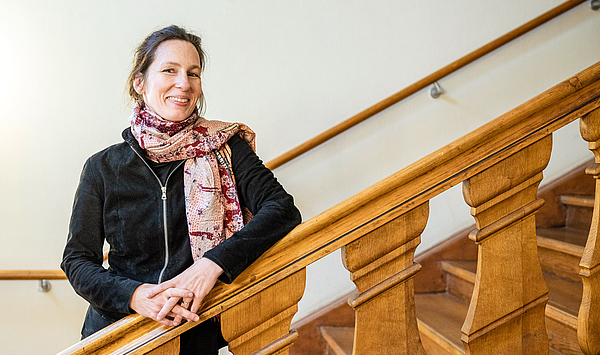
"There's no getting around Liszt"
Starting 1 October 2022, Prof. Dr. Nina Noeske will teach musicology with a focus on the 19th century in Weimar
The joint Department of Musicology of the University of Music FRANZ LISZT Weimar and the Friedrich Schiller University of Jena is pleased to announce the appointment of a new professor who is both competent and enthusiastic about research.
In succession to Prof. Dr. Christiane Wiesenfeldt, Prof. Dr. Nina Noeske has been appointed Professor of Musicology with a focus on the 19th century as of 1 October 2022. For the past eight years, Nina Noeske held a professorship in musicology with a gender focus at the Hamburg University of Music and Theatre.
"I can hardly imagine a better place to teach and research," says the newly appointed about her new sphere of activity. "My focus on the 19th and 20th centuries, which I have already thematically deepened in my dissertation and habilitation, can be excellently continued, supplemented and expanded in Weimar."
Nina Noeske sees the cooperation model between the Weimar University of Music and the University of Jena as an advantage: the fact that the subject of musicology is offered alongside the artistic degree programmes is not a matter of course. She sees further opportunities for cooperation with, among others, the Bauhaus University Weimar, the Goethe and Schiller Archive and the Klassik Stiftung Weimar with its Liszt House - and thus "huge opportunities for research and teaching".
One of Nina Noeske's research focuses will be on the 19th century, with Liszt and his circle as well as the associated networks and circles of students, but also the ideas and concepts that emanated from there, being an important point of contact.
"You can't get around Liszt if you deal with compositional, aesthetic and music-political tendencies of the 19th century," says the professor. "I still consider him one of the most inspiring musical personalities, in whom different, not only musical, currents unite."
In the past 20 years, the musicological research landscape has changed a lot, says Nina Noeske: "This means that current cultural-scientific approaches, a music historiography beyond the 'crests of the heights', gender aspects, etc. will also come into play. Aesthetic and music-philosophical questions, the investigation of value judgements in the course of history, correspondences and cross-connections between the arts, points of contact between music and politics, but also methodological questions about music historiography in the third millennium will certainly continue to drive me in the coming years. Undoubtedly, in addition to the 19th century, the 20th century will also play a role in my research and teaching, with a focus on the GDR and Eastern Europe, on film music and contemporary music - sometimes even extending to the pop field."
Nina Noeske studied musicology, philosophy and music practice in Bonn, Weimar and Jena. She did her doctorate on "New Instrumental Music in the GDR" at the Department of Musicology Weimar-Jena in 2005. She then worked there as a research assistant in the project "The New German School" and was then a research assistant in the research centre "Music and Gender" at the Hanover University of Music, Drama and Media from 2007 to 2011.
In 2012, she held professorships in Hanover and at the Hamburg University of Music and Theatre. From 2012 to 2014, she taught and researched as an assistant professor at the University of Salzburg. In 2014 - immediately following her habilitation in Hanover on the topic of "Discourse Analysis of Liszt's 'Faust Symphony'" - she accepted a professorship in musicology with a gender focus at the Hamburg University of Music and Theatre. There she became co-editor of MUGI (Music and Gender on the Internet), among other things. Since 2018, she has also been co-leading the project "Music History Online: DDR".
[29 September 2022]
